连系动词用法详解
连系动词的概念与用法

连系动词的概念与用法一、连系动词的概念及理解连系动词就是表示不完全谓语关系的动词 ,用于连接主语和表语,说明主语的状态,性质,特征或身份等。
它与其后的表语一起构成谓语。
连系动词有一定的词义,但不完整。
不能单独作谓语,必须和表语连用,构成系表结构,也叫做复合谓语。
二、连系动词的分类连系动词根据其意义特点可分为以下几类:1. 状态系动词:用来表示主语状态,只有be一词。
如:(1)He was famous as a scholar [ˈskɒlə(r)]学者 .作为一位学者他很著名。
(2)We are anxious[ˈæŋkʃəs]焦急的 about his safety.我们为他的安全而忧虑。
(3)The children are very happy. 孩子们很快乐。
2.持续系动词:用来表示主语继续或保持一种状况或态度,主要有:keep保持, remain(仍是), stay(保持)lie躺, stand站 sit坐rest休息, continue [kənˈtɪnju:] 持续等(1)Would you please keep silent [ˈsaɪlənt]沉默的a minute?可以请你安静一下吗?(2)This matter rests a mystery[ˈmɪstri]谜 .此事仍是一个谜。
/It's still a mystery.3.感官系动词:用于表示感官的感受,如:look(看起来), feel(感到、摸起来), sound(听起来),smell(闻起来), taste(尝起来)等。
(1)The rose[rəuz]玫瑰smells sweet [swi:t] 芳香的,甜的.玫瑰花香。
/玫瑰闻起来很香。
(2)The cloth[klɔθ]布 feels soft[sɔft] 柔软的.这布摸上去很柔软。
(3)This coffee tastes bitter[ˈbɪtə(r)]苦的 .这种咖啡味道苦。
表示变化的连系动词用法
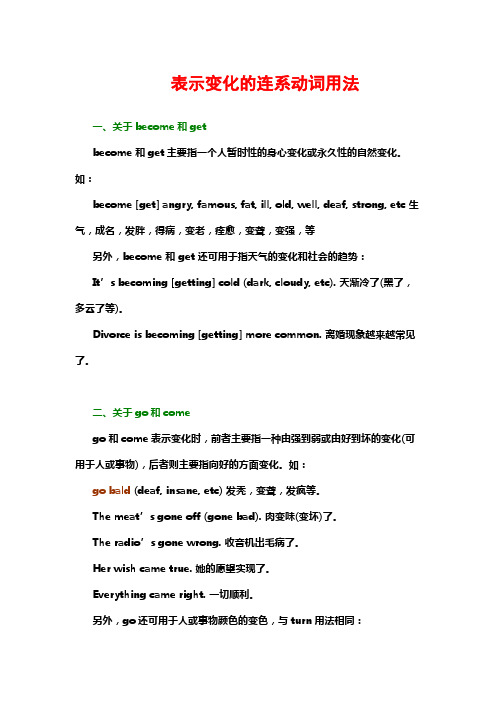
表示变化的连系动词用法一、关于become和getbecome 和get主要指一个人暂时性的身心变化或永久性的自然变化。
如:become [get] angry, famous, fat, ill, old, well, deaf, strong, etc 生气,成名,发胖,得病,变老,痊愈,变聋,变强,等另外,become 和 get 还可用于指天气的变化和社会的趋势:It’s becoming [getting] cold (dark, cloudy, etc).天渐冷了(黑了,多云了等)。
Divorce is becoming [getting] more common. 离婚现象越来越常见了。
二、关于go和comego 和come表示变化时,前者主要指一种由强到弱或由好到坏的变化(可用于人或事物),后者则主要指向好的方面变化。
如:go bald (deaf, insane, etc) 发秃,变聋,发疯等。
The meat’s gone off (gone bad).肉变味(变坏)了。
The radio’s gone wrong.收音机出毛病了。
Her wish came true. 她的愿望实现了。
Everything came right. 一切顺利。
另外,go还可用于人或事物颜色的变色,与turn用法相同:She went [turned] blue with cold. 她冻得脸色发青了。
The rotten meat went [turned] green. 这块腐烂的肉变绿了。
【注】①但是 go 一般不与 old, tired, ill 等连用,遇此情况要用其他连系动词:grow [get] old 变老,fall [become] ill (sick) 生病,get [feel] tired 疲劳② go后接形容词通常表示的结果(见上例),在个别搭配中也表示现状:go hungry 挨饿,go naked 光着身子③ come 除表示向好的方面变化外,还有以下常见搭配值得注意:come untied 解开,come loose 变松,come undone 松开三、关于growgrow 主要表示逐渐变化,强调变化的过程。
最全英语连系动词用法综述(初)

英语连系动词用法综述(初)知识定位系动词:亦称连系动词。
作为系动词,它本身有词义,但不能单独用作谓语,后边必须跟表语,亦称补语(形容词),构成系表结构说明主语的状况、性质、特征等情况。
由于英语连系动词用法灵活,用途广泛,在很多情况下只有连接作用而没有具体的意义,因此,导致很多学生往往无法正确选择合适而又正确的连系动词来构建句子,说出或写出错句。
因此,连系动词成为很多地方中考英语单项选择题中不可缺少的考查点。
知识梳理系动词的分类:1)状态系动词用来表示主语状态,只有be 一词,例如:He is a teacher. 他是一名教师。
(is 与补足语一起说明主语的身份。
)2)持续系动词用来表示主语继续或保持一种状况或态度,主要有keep, rest, remain, stay, lie, stand, 例如:He always kept silent at meeting. 他开会时总保持沉默。
This matter rests a mystery. 此事仍是一个谜。
3)表像系动词用来表示"看起来像"这一概念,主要有seem, appear, look, 例如:He looks tired. 他看起来很累。
He seems (to be) very sad. 他看起来很伤心。
4)感官系动词感官系动词主要有feel, smell, sound, taste, 例如:This kind of cloth feels very soft.这种布手感很软。
This flower smells very sweet.这朵花闻起来很香。
5)变化系动词这些系动词表示主语变成什么样,变化系动词主要有become, grow, turn, fall, get, go, come,run.例如:He became mad after that. 自那之后,他疯了。
She grew rich within a short time. 她没多长时间就富了。
英语表示“变化”连系动词的用法
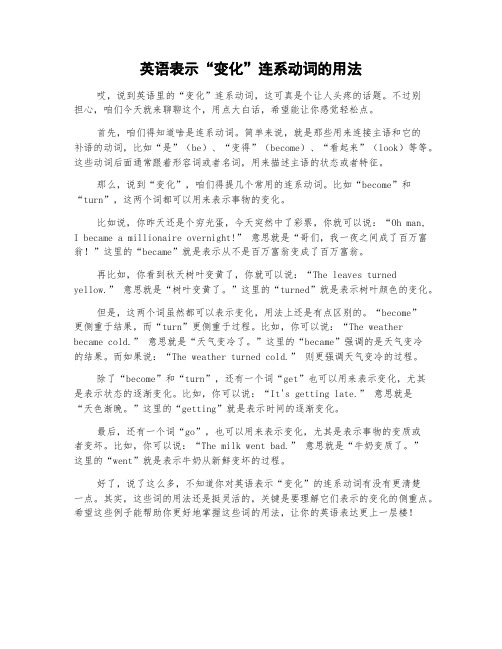
英语表示“变化”连系动词的用法哎,说到英语里的“变化”连系动词,这可真是个让人头疼的话题。
不过别担心,咱们今天就来聊聊这个,用点大白话,希望能让你感觉轻松点。
首先,咱们得知道啥是连系动词。
简单来说,就是那些用来连接主语和它的补语的动词,比如“是”(be)、“变得”(become)、“看起来”(look)等等。
这些动词后面通常跟着形容词或者名词,用来描述主语的状态或者特征。
那么,说到“变化”,咱们得提几个常用的连系动词。
比如“become”和“turn”,这两个词都可以用来表示事物的变化。
比如说,你昨天还是个穷光蛋,今天突然中了彩票,你就可以说:“Oh man, I became a millionaire overnight!” 意思就是“哥们,我一夜之间成了百万富翁!”这里的“became”就是表示从不是百万富翁变成了百万富翁。
再比如,你看到秋天树叶变黄了,你就可以说:“The leaves turned yellow.” 意思就是“树叶变黄了。
”这里的“turned”就是表示树叶颜色的变化。
但是,这两个词虽然都可以表示变化,用法上还是有点区别的。
“become”更侧重于结果,而“turn”更侧重于过程。
比如,你可以说:“The weather became cold.” 意思就是“天气变冷了。
”这里的“became”强调的是天气变冷的结果。
而如果说:“The weather turned cold.” 则更强调天气变冷的过程。
除了“become”和“turn”,还有一个词“get”也可以用来表示变化,尤其是表示状态的逐渐变化。
比如,你可以说:“It's getting late.” 意思就是“天色渐晚。
”这里的“getting”就是表示时间的逐渐变化。
最后,还有一个词“go”,也可以用来表示变化,尤其是表示事物的变质或者变坏。
比如,你可以说:“The milk went bad.” 意思就是“牛奶变质了。
连系动词用法详解

连系动词连系动词,它本身有词义,但不能单独用作谓语,后边必须跟表语(亦称补语),构成系表结构说明主语的状况、性质、特征等情况。
表语通常由名词、形容词,或相当于名词或形容词的词或短语等充当,说明主语是什么或怎么样。
连系动词(又称系动词)一连系动词的类型可分为六类:1、状态系动词2、持续系动词3、表像系动词4、感官系动词5、变化系动词6、终止系动词状态系动词:只有be一词。
如:She is always like that. 她总是那样。
持续系动词:表示主语继续或保持一种状况或态度,主要有keep, remain, stay, rest, lie, stand。
如:I hope you’ll keep fit. 我希望你身体好。
He stayed single. 他仍然是单身。
表像系动词:表示“看起来好像”,主要有seem, appear, look等。
如:He looks tired. 他看起来很累。
He seems (to be) quite happy. 他好像很快活。
感官系动词:表示“……起来”,有feel(摸起来,感觉) , smell(闻起来) , sound(听起来) , taste(尝起来,吃起来) 等。
如:This kind of cloth feels very soft. 这种布摸起来很软。
He looks honest, but actually he’s a rogue. 他看起来很老实,实际他是一个坏蛋。
They all look alike to me. 他们的模样我看起来都一样。
Everybody feels contented. 每个人都感到很满足。
变化系动词:表示主语变成什么样,主要有become, grow, turn, fall, get, go, come, run 这个不太好理解,多来点例句。
He became mad after that. 自那之后,他疯了。
连系动词与情态动词用法
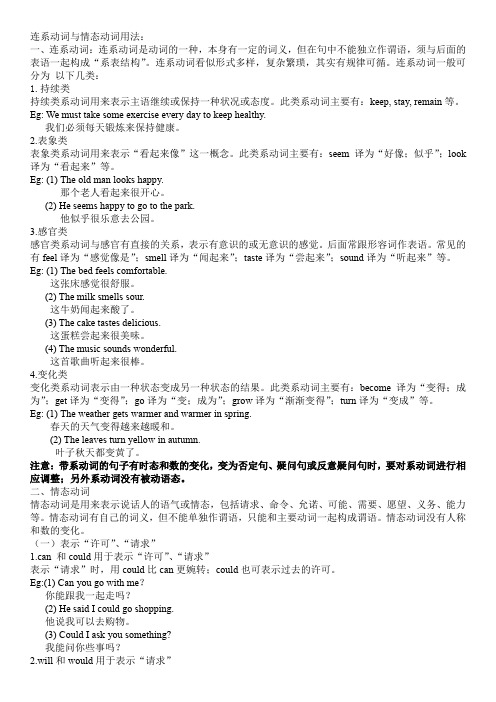
连系动词与情态动词用法:一、连系动词:连系动词是动词的一种,本身有一定的词义,但在句中不能独立作谓语,须与后面的表语一起构成“系表结构”。
连系动词看似形式多样,复杂繁琐,其实有规律可循。
连系动词一般可分为以下几类:1.持续类持续类系动词用来表示主语继续或保持一种状况或态度。
此类系动词主要有:keep, stay, remain等。
Eg: We must take some exercise every day to keep healthy.我们必须每天锻炼来保持健康。
2.表象类表象类系动词用来表示“看起来像”这一概念。
此类系动词主要有:seem 译为“好像;似乎”;look 译为“看起来”等。
Eg: (1) The old man looks happy.那个老人看起来很开心。
(2) He seems happy to go to the park.他似乎很乐意去公园。
3.感官类感官类系动词与感官有直接的关系,表示有意识的或无意识的感觉。
后面常跟形容词作表语。
常见的有feel译为“感觉像是”;smell译为“闻起来”;taste译为“尝起来”;sound译为“听起来”等。
Eg: (1) The bed feels comfortable.这张床感觉很舒服。
(2) The milk smells sour.这牛奶闻起来酸了。
(3) The cake tastes delicious.这蛋糕尝起来很美味。
(4) The music sounds wonderful.这首歌曲听起来很棒。
4.变化类变化类系动词表示由一种状态变成另一种状态的结果。
此类系动词主要有:become译为“变得;成为”;get译为“变得”;go译为“变;成为”;grow译为“渐渐变得”;turn译为“变成”等。
Eg: (1) The weather gets warmer and warmer in spring.春天的天气变得越来越暖和。
连系动词的用法
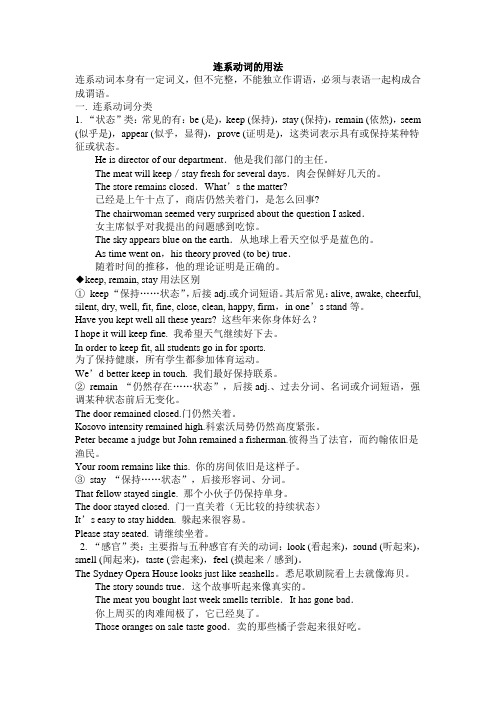
连系动词的用法连系动词本身有一定词义,但不完整,不能独立作谓语,必须与表语一起构成合成谓语。
一. 连系动词分类1. “状态”类:常见的有:be (是),keep (保持),stay (保持),remain (依然),seem (似乎是),appear (似乎,显得),prove (证明是),这类词表示具有或保持某种特征或状态。
He is director of our department.他是我们部门的主任。
The meat will keep/stay fresh for several days.肉会保鲜好几天的。
The store remains closed.What’s the matter?已经是上午十点了,商店仍然关着门,是怎么回事?The chairwoman seemed very surprised about the question I asked.女主席似乎对我提出的问题感到吃惊。
The sky appears blue on the earth.从地球上看天空似乎是蓝色的。
As time went on,his theory proved (to be) true.随着时间的推移,他的理论证明是正确的。
◆keep, remain, stay用法区别①keep “保持……状态”,后接adj.或介词短语。
其后常见:alive, awake, cheerful, silent, dry, well, fit, fine, close, clean, happy, firm,in one’s stand等。
Have you kept well all these years? 这些年来你身体好么?I hope it will keep fine. 我希望天气继续好下去。
In order to keep fit, all students go in for sports.为了保持健康,所有学生都参加体育运动。
连系动词的理解与用法

连系动词的理解与⽤法连系动词的理解与⽤法⼀、连系动词的概念说明你在汉语中听说过“连系动词”吗?没有!连系动词是很具英语特⾊的⼀类动词,简单地说,连系动词就是表⽰不完全谓语关系的动词——⽤于表明真正的谓语(即表语)在其后。
连系动词有⼀定的词义,但不完整。
不能单独作谓语,必须和表语连⽤,构成系表结构,也叫做复合谓语。
常⽤的系动词有:be(是), become(变得), turn(变得),seem(似乎),grow(变得),look(看起来),feel(感到、摸起来),taste(尝起来),smell(闻起来),sound(听起来), remain(仍是),get(变、是),appear(显得),go(变得),come(变成),stay(保持)等。
如:The children are very happy. 孩⼦们很快乐。
She seems angry. 她似乎很⽣⽓。
Our dream has come true. 我们的梦想实现了。
We get wiser as we get old. 随着年岁的增长,我们也变得聪明些了。
⼆、连系动词的语法特点英语中所有的连系动词都是不及物的,所以所有连系动词都不能⽤于被动语态,即使有时在汉语中有被动意味也是如此。
如:他的解释听起来很有道理。
误:His explanation is sounded reasonable.正:His explanation sounds reasonable.从汉语来看,“他的解释”⾃⼰不能“听”,应该是“被听”才对,所以上⾯的误句据此⽤了被动语态。
但是,由于sound在此是连系动词,它不能⽤于被动语态。
其实,sound在此的意思不是“听”,⽽是“听起来”,或者说是“被听起来”。
look sad还是look sadly请看这道题:The children all looked _________ at the broken model plane and felt quite _________.A. sad, sadB. sadly, sadlyC. sad, sadlyD. sadly, sad 【分析】此题容易误选A,想当然地认为 look 和 feel 均为连系动词,所以其后接形容词作表语。
连系动词的用法讲解及练习题
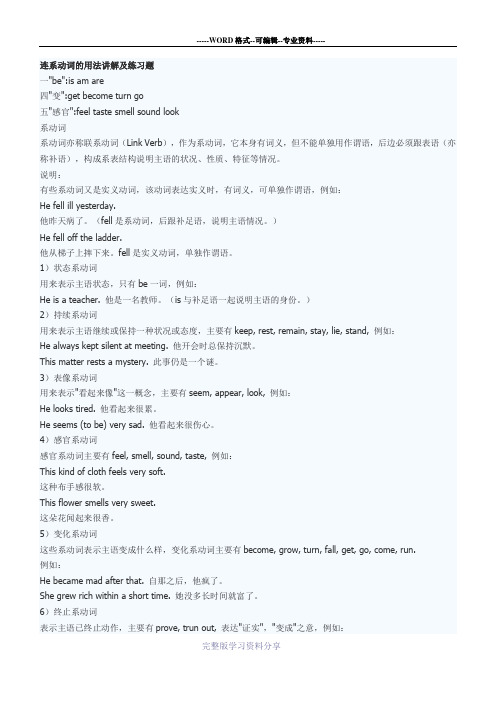
连系动词的用法讲解及练习题一"be":is am are四"变":get become turn go五"感官":feel taste smell sound look系动词系动词亦称联系动词(Link Verb),作为系动词,它本身有词义,但不能单独用作谓语,后边必须跟表语(亦称补语),构成系表结构说明主语的状况、性质、特征等情况。
说明:有些系动词又是实义动词,该动词表达实义时,有词义,可单独作谓语,例如:He fell ill yesterday.他昨天病了。
(fell是系动词,后跟补足语,说明主语情况。
)He fell off the ladder.他从梯子上摔下来。
fell是实义动词,单独作谓语。
1)状态系动词用来表示主语状态,只有be一词,例如:He is a teacher. 他是一名教师。
(is与补足语一起说明主语的身份。
)2)持续系动词用来表示主语继续或保持一种状况或态度,主要有keep, rest, remain, stay, lie, stand, 例如:He always kept silent at meeting. 他开会时总保持沉默。
This matter rests a mystery. 此事仍是一个谜。
3)表像系动词用来表示"看起来像"这一概念,主要有seem, appear, look, 例如:He looks tired. 他看起来很累。
He seems (to be) very sad. 他看起来很伤心。
4)感官系动词感官系动词主要有feel, smell, sound, taste, 例如:This kind of cloth feels very soft.这种布手感很软。
This flower smells very sweet.这朵花闻起来很香。
5)变化系动词这些系动词表示主语变成什么样,变化系动词主要有become, grow, turn, fall, get, go, come, run.例如:He became mad after that. 自那之后,他疯了。
英语连系动词用法

9)Your cold isgrowing worse. But presently shegrew calmer.
10)The sorghum hasgrownunusuallytallthis year.[今年高粱长得特别高]
6) Keep on as you are doing anddon’t get puffed up.[不要骄傲自满]
7) They aregettingincreasinglyisolated.[他们越来越孤立]
8) They allgot soaked. 9) What is more, they oftengot stuckin the mud.
3)We will neverleavea jobunfinished.
4)But a day’s talkleftthem stilldividedon some issues.
9、lay **
[处于某种状态]
1)As a result, soil alkalinity rose and farmlandlay barren.
4) The enemybecame more franticin its death-bed struggle.
2、跟过去分词
1)Dauntless in spirit, theybecame steeledthrough hardship.
2)The room soonbecame crowded.
2)The whole area haslain wastefor many years.
3)For many years thislay heavyon his conscience.
动词的连系动词用法
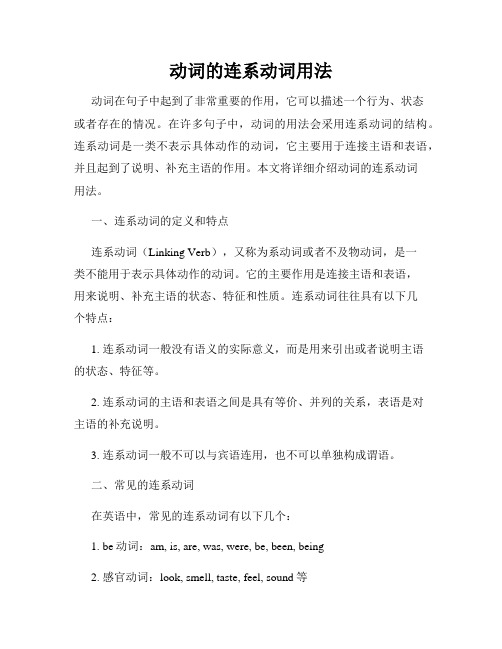
动词的连系动词用法动词在句子中起到了非常重要的作用,它可以描述一个行为、状态或者存在的情况。
在许多句子中,动词的用法会采用连系动词的结构。
连系动词是一类不表示具体动作的动词,它主要用于连接主语和表语,并且起到了说明、补充主语的作用。
本文将详细介绍动词的连系动词用法。
一、连系动词的定义和特点连系动词(Linking Verb),又称为系动词或者不及物动词,是一类不能用于表示具体动作的动词。
它的主要作用是连接主语和表语,用来说明、补充主语的状态、特征和性质。
连系动词往往具有以下几个特点:1. 连系动词一般没有语义的实际意义,而是用来引出或者说明主语的状态、特征等。
2. 连系动词的主语和表语之间是具有等价、并列的关系,表语是对主语的补充说明。
3. 连系动词一般不可以与宾语连用,也不可以单独构成谓语。
二、常见的连系动词在英语中,常见的连系动词有以下几个:1. be动词:am, is, are, was, were, be, been, being2. 感官动词:look, smell, taste, feel, sound等3. 变化动词:become, get, grow, turn, go等4. 保持动词:keep, stay, remain等三、连系动词的用法1. be动词的用法Be动词是最常见的连系动词,它用来连接主语和表语,表示主语的状态、性质、特征等。
以下是be动词的一些基本用法:(1)连接主语和名词/形容词:- She is a doctor. 她是一个医生。
- The book is interesting. 这本书很有趣。
(2)连接主语和表语从句:- He is happy that he passed the exam. 他很高兴通过了考试。
(3)连接主语和介词短语/副词:- They are in the park. 他们在公园里。
- She is here. 她在这里。
2. 感官动词的用法感官动词用来描述主语的感官体验或者感知能力。
连系动词及其用法

come, get, fall, grow, turn, go, become,run grow 1.When we_______up, we're going to help build up our country. turned 2.Her face _______red. went 3.The meat_______bad. went 5.The machine ______out of order. fell asleep 6. My father was so tired that he _____ quickly. become 7. He has _______an excellent actor. turned excellent actor. = He has ______ 8. My son ______6 turned in July. gets paid for teaching others. 9. He ____ run 10. I saw that the garden had _____wild
【练一练】 1)
A
, I’ll be glad to take your place.
A. If necessary B. If so C. If any D. If ever 2) Do you ever have the measles, and B how many? A. If necessary B. If so C. If any D. If ever
连系动词及其用法
学科网
1. What is a linking verb?
Translation:
1. 他正看着这幅图。这幅画看上去很美。
He is looking at the picture. It looks nice. It sounds a good idea. Please sound the bell and ask them to come in.
系动词分类用法

系动词定义系动词亦称连系动词(Link Verb),作为系动词,它本身有词义,但不能单独用作谓语,后边必须跟表语,构成系表结构说明主语的状况、性质、特征等情况。
He feel ill yesterday.他昨天病了。
(feel是系动词,后跟表语,说明主语情况。
分类1)状态系动词用来表示主语性质或状态,只有be一词,例如:He is a teacher. 他是一名教师。
(表示主语的身份--性质)He is ill. 他病了。
(表示主语的状态)2)持续系动词用来表示主语继续或保持一种状况或态度,主要有keep, remain[rɪ'meɪn]保持, stay例如:I hope weather will keep fine.我希望天会一直晴朗下去。
I hope the weather stays this way.我希望天气总是那么好。
He remained single['sɪŋgəl]单身的all his life.他打了一辈子光棍。
3)表像系动词用来表示"看起来像"这一概念,主要有seem,look,例如:He looks tired. 他看起来很累。
He seems (to be) very sad. 他看起来很伤心。
4)感官系动词感官系动词主要有feel, smell[smel]嗅,闻,sound[saʊnd]听, taste, 例如:This dress feels very soft[sɒft]柔软的.这连衣裙手感很软。
Just so-so, I feel tired疲惫的.This green pepper tastes a little hot.5)变化系动词这些系动词表示主语变成什么样,变化系动词主要有become, grow[grəʊ], get例如:The weather is getting warmer and warmer.He became a teacher after that. 自那之后,他成为了一名老师。
英语中的连系动词用法
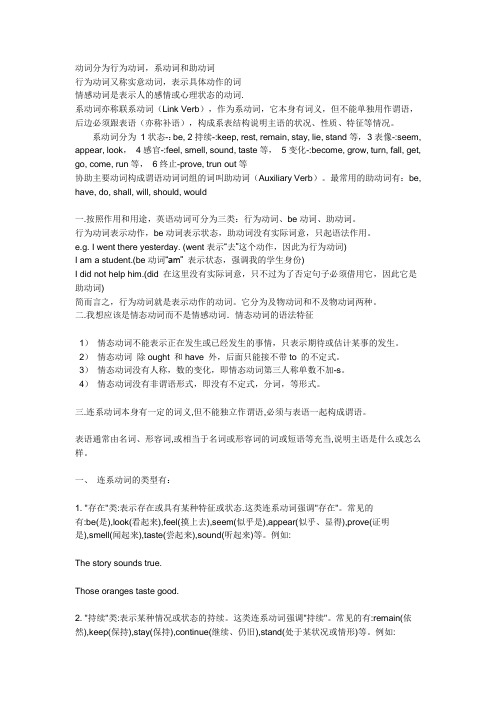
动词分为行为动词,系动词和助动词行为动词又称实意动词,表示具体动作的词情感动词是表示人的感情或心理状态的动词.系动词亦称联系动词(Link Verb),作为系动词,它本身有词义,但不能单独用作谓语,后边必须跟表语(亦称补语),构成系表结构说明主语的状况、性质、特征等情况。
系动词分为1状态-:be, 2持续-:keep, rest, remain, stay, lie, stand等,3表像-:seem, appear, look,4感官-:feel, smell, sound, taste等,5变化-:become, grow, turn, fall, get, go, come, run等,6终止-prove, trun out等协助主要动词构成谓语动词词组的词叫助动词(Auxiliary Verb)。
最常用的助动词有:be, have, do, shall, will, should, would一.按照作用和用途,英语动词可分为三类:行为动词、be动词、助动词。
行为动词表示动作,be动词表示状态,助动词没有实际词意,只起语法作用。
e.g. I went there yesterday. (went表示“去”这个动作,因此为行为动词)I am a student.(be动词“am” 表示状态,强调我的学生身份)I did not help him.(did 在这里没有实际词意,只不过为了否定句子必须借用它,因此它是助动词)简而言之,行为动词就是表示动作的动词。
它分为及物动词和不及物动词两种。
二.我想应该是情态动词而不是情感动词.情态动词的语法特征1)情态动词不能表示正在发生或已经发生的事情,只表示期待或估计某事的发生。
2)情态动词除ought 和have 外,后面只能接不带to 的不定式。
3)情态动词没有人称,数的变化,即情态动词第三人称单数不加-s。
4)情态动词没有非谓语形式,即没有不定式,分词,等形式。
系动词及其用法

THINK IT OVER
C. less
D. well
Choose the best answer
1. -----Would you advise me on how to stay_____?
-----Try to live regularly, eat more vegetables and be in a good state of mind.
+ adj.
+ n. 注意记忆 惯用搭配
现在\过去\ 将来\进行\ 完成时
主动表被动
系动词主动表被 动 不定式可主动或 被动
无被动
状态持续 系动词
keep, remain, stay, lie etc.
+ adj. + n.
一般现 在或过 去时
无被动
feel 作系动词的用法
❖ 1. 表”某物体给人的感觉”,只用一般现在或过 去时
3. The traffic lights_____ green and I pulled away. A. came B.grew C. got D. went
4. --- Is your headache getting _____?
--- No, it’s worse.
A. better
B. bad
looked for work in London. ❖ Nothing remains to be said.
(现在已经没有什么好说的了)
ቤተ መጻሕፍቲ ባይዱ
Choose the best answer
1. It is a good plan in theory, but it _____ to be seen whether it works in practice. A. waits B. stays C. stands D. remains
连系动词的分类
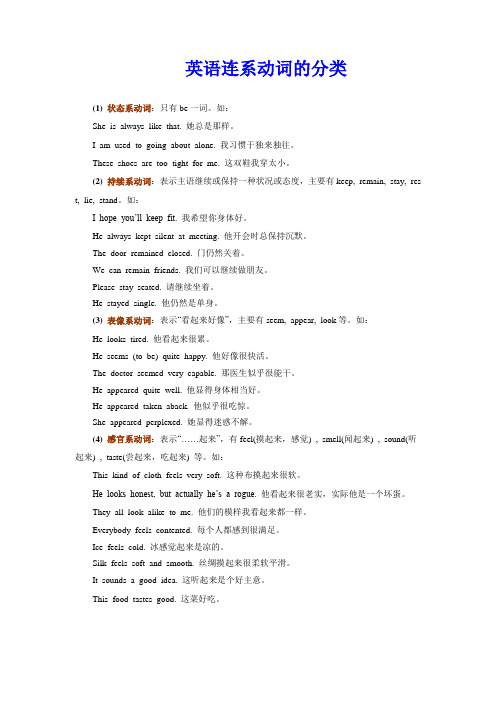
英语连系动词的分类(1) 状态系动词:只有be一词。
如:She is always like that. 她总是那样。
I am used to going about alone. 我习惯于独来独往。
These shoes are too tight for me. 这双鞋我穿太小。
(2) 持续系动词:表示主语继续或保持一种状况或态度,主要有keep, remain, stay, res t, lie, stand。
如:I hope you’ll keep fit. 我希望你身体好。
He always kept silent at meeting. 他开会时总保持沉默。
The door remained closed. 门仍然关着。
We can remain friends. 我们可以继续做朋友。
Please stay seated. 请继续坐着。
He stayed single. 他仍然是单身。
(3) 表像系动词:表示“看起来好像”,主要有seem, appear, look等。
如:He looks tired. 他看起来很累。
He seems (to be) quite happy. 他好像很快活。
The doctor seemed very capable. 那医生似乎很能干。
He appeared quite well. 他显得身体相当好。
He appeared taken aback. 他似乎很吃惊。
She appeared perplexed. 她显得迷惑不解。
(4) 感官系动词:表示“……起来”,有feel(摸起来,感觉) , smell(闻起来) , sound(听起来) , taste(尝起来,吃起来) 等。
如:This kind of cloth feels very soft. 这种布摸起来很软。
He looks honest, but actually he’s a rogue. 他看起来很老实,实际他是一个坏蛋。
英语中常见系动词的用法
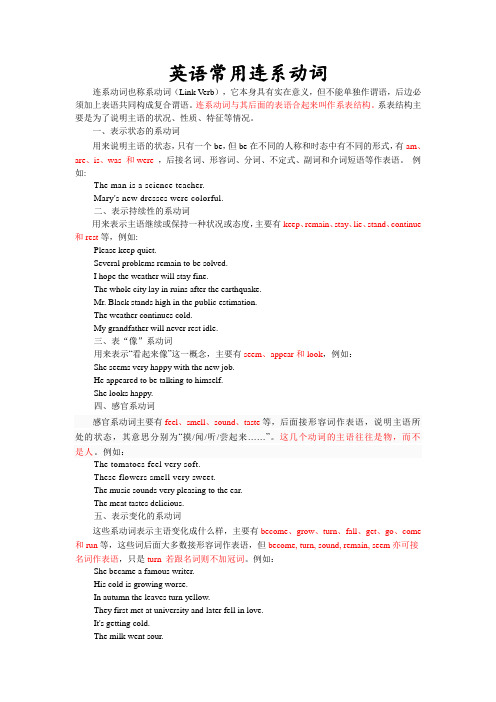
英语常用连系动词连系动词也称系动词(Link Verb),它本身具有实在意义,但不能单独作谓语,后边必须加上表语共同构成复合谓语。
连系动词与其后面的表语合起来叫作系表结构。
系表结构主要是为了说明主语的状况、性质、特征等情况。
一、表示状态的系动词用来说明主语的状态,只有一个be,但be在不同的人称和时态中有不同的形式,有am、are、is、was 和were ,后接名词、形容词、分词、不定式、副词和介词短语等作表语。
例如:The man is a science teacher.Mary's new dresses were colorful.二、表示持续性的系动词用来表示主语继续或保持一种状况或态度,主要有keep、remain、stay、lie、stand、continue 和rest等,例如:Please keep quiet.Several problems remain to be solved.I hope the weather will stay fine.The whole city lay in ruins after the earthquake.Mr. Black stands high in the public estimation.The weather continues cold.My grandfather will never rest idle.三、表“像”系动词用来表示“看起来像”这一概念,主要有seem、appear和look,例如:She seems very happy with the new job.He appeared to be talking to himself.She looks happy.四、感官系动词感官系动词主要有feel、smell、sound、taste等,后面接形容词作表语,说明主语所处的状态,其意思分别为“摸/闻/听/尝起来……”。
常用的连系动词及用法
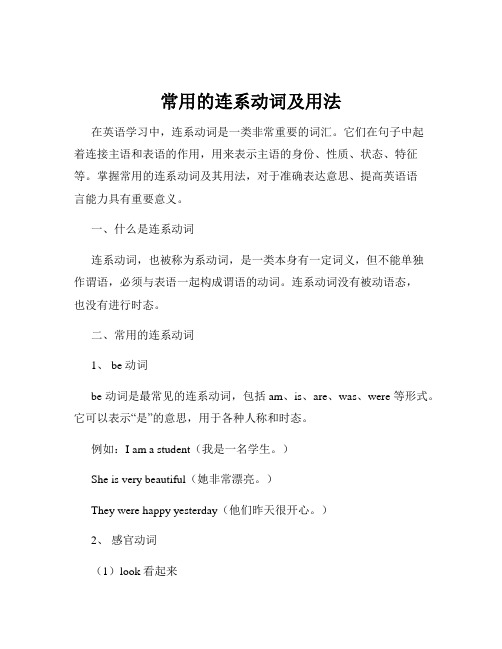
常用的连系动词及用法在英语学习中,连系动词是一类非常重要的词汇。
它们在句子中起着连接主语和表语的作用,用来表示主语的身份、性质、状态、特征等。
掌握常用的连系动词及其用法,对于准确表达意思、提高英语语言能力具有重要意义。
一、什么是连系动词连系动词,也被称为系动词,是一类本身有一定词义,但不能单独作谓语,必须与表语一起构成谓语的动词。
连系动词没有被动语态,也没有进行时态。
二、常用的连系动词1、 be 动词be 动词是最常见的连系动词,包括 am、is、are、was、were 等形式。
它可以表示“是”的意思,用于各种人称和时态。
例如:I am a student(我是一名学生。
)She is very beautiful(她非常漂亮。
)They were happy yesterday(他们昨天很开心。
)2、感官动词(1)look 看起来例如:You look tired(你看起来很累。
)(2)sound 听起来The music sounds wonderful(这音乐听起来很棒。
)(3)smell 闻起来The flowers smell sweet(这些花闻起来很香。
)(4)taste 尝起来The cake tastes delicious(这个蛋糕尝起来很美味。
)(5)feel 感觉,摸起来This cloth feels soft(这块布摸起来很柔软。
)3、表示状态变化的动词(1)become 变得,成为He became a doctor(他成为了一名医生。
)(2)get 变得It's getting colder and colder(天气变得越来越冷。
)(3)grow 逐渐变得The child is growing taller(这个孩子渐渐长高了。
)(4)turn 变得The leaves turn yellow in autumn(秋天树叶变黄了。
)(5)go 变得(通常指不好的变化)The milk has gone bad(牛奶变质了。
- 1、下载文档前请自行甄别文档内容的完整性,平台不提供额外的编辑、内容补充、找答案等附加服务。
- 2、"仅部分预览"的文档,不可在线预览部分如存在完整性等问题,可反馈申请退款(可完整预览的文档不适用该条件!)。
- 3、如文档侵犯您的权益,请联系客服反馈,我们会尽快为您处理(人工客服工作时间:9:00-18:30)。
连系动词用法详解连系动词本身有一定词义,但不完整,不能独立作谓语,必须与表语一起构成合成谓语。
一 . 连系动词分类1. “状态”类:常见的有:be (是),keep (保持),stay (保持),remain (依然),seem (似乎是),appear (似乎,显得),prove (证明是),这类词表示具有或保持某种特征或状态。
①He is director of our department.他是我们部门的主任。
②The meat will keep/stay fresh for several days.肉会保鲜好几天的。
③The store remains closed.What’s the matter?已经是上午十点了,商店仍然关着门,是怎么回事?④The chairwoman seemed very surprised about the question I asked.女主席似乎对我提出的问题感到吃惊。
⑤The sky appears blue on the earth.从地球上看天空似乎是蓝色的。
⑥As time went on,his theory proved (to be) true.随着时间的推移,他的理论证明是正确的。
◆◆keep, remain, stay用法区别①keep “保持……状态”,后接adj.或介词短语。
其后常见:alive, awake, cheerful, silent, dry, well, fit, fine, close, clean, happy, firm,in one’s stand等。
Have you kept well all these years? 这些年来你身体好么?I hope it will keep fine. 我希望天气继续好下去。
In order to keep fit, all students go in for sports. 为了保持健康,所有学生都参加体育运动。
We’d better keep in touch. 我们最好保持联系。
②remain “仍然存在……状态”,后接adj.、过去分词、名词或介词短语,强调某种状态前后无变化。
The door remained closed.门仍然关着。
Kosovo intensity remained high.科索沃局势仍然高度紧张。
Peter became a judge but John remained a fisherman.彼得当了法官,而约翰依旧是渔民。
Your room remains like this. 你的房间依旧是这样子。
③stay “保持……状态”,后接形容词、分词。
That fellow stayed single. 那个小伙子仍保持单身。
The door stayed closed. 门一直关着(无比较的持续状态)It’s easy to stay hidden. 躲起来很容易。
Please stay seated. 请继续坐着。
2. “感官”类:主要指与五种感官有关的动词:look (看起来),sound (听起来),smell (闻起来),taste (尝起来),feel (摸起来/ 感到)。
The Sydney Opera House looks just like seashells。
悉尼歌剧院看上去就像海贝。
The story sounds true.这个故事听起来像真实的。
The meat you bought last week smells terrible.It has gone bad.你上周买的肉难闻极了,它已经臭了。
Those oranges on sale taste good.卖的那些橘子尝起来很好吃。
Silk feels soft.丝绸摸上去很柔软。
3. “变化”类:常见的有三组⑴turn (变成),grow (变得),get (变成),become (变成),make ()⑵come (变得),go (变得),⑶fall (进入某状态), run (变成,进入)4. 双谓语系动词此类系动词既有系动词的功能,后接表语,又保留原实义动词本身的含义。
例如:The run rose red. 太阳升起红艳艳。
She stopped and stood quite still. 她停下来然后一丝不动地站着。
The book lay open on the table. 那书在桌子上打开着。
The snow lay thick on the ground. 雪厚厚地堆积在地上。
He married young. 他结婚很早。
The window blew open. 窗户吹开了。
She blushed as red as a peony. 她的脸红得像一朵牡丹花。
Lei Feng died young. 雷锋早逝。
The material has worn thin. 这种布料已穿薄了。
The weather continued calm. 天气仍然平静。
He continued silent.他继续沉默不语。
二. become, come, go, get, grow, turn的用法与区别1. become 和get主要指一个人暂时性的身心变化或永久性的自然变化。
另外,become 和get 还可用于指天气的变化和社会的趋势。
如:⑴become / get / angry, famo us, ill, old, well, deaf, strong:生气,成名,得病,变老,痊愈,变聋,变强⑵get dressed 穿衣服get changed 换衣服It’s becoming / getting cold (dark, cloudy, etc). 天渐冷了(黑了,多云了等)。
Divorce is becoming / getting more common. 离婚现象越来越常见了。
Last night I got caught in the downpour. 昨夜我被雨淋了(表示意想不到)The new car got scratched. 新车给刮坏了。
(表突发性)2. go 和come表示变化时,前者主要指一种由强到弱或由好到坏的变化,后者则主要指向好的方面变化。
come和go还可接有否定前缀的过去分词。
go bald / deaf / insane 发秃/ 变聋/ 发疯go blind变瞎go hungry 挨饿,go naked 光着身子His report went unnoticed. 他的报告没人注意。
The meat’s gone bad. 肉变坏了。
The radio’s gone wrong. 收音机出毛病了。
Her wish came true. 她的愿望实现了。
[来源:] Everything came right. 一切顺利。
【注】come 除表示向好的方面变化外,还有以下常见搭配值得注意:come untied 解开,come loose 变松,come undone 松开3. go和turn还可用于人或事物颜色的变化。
She went / turned blue with cold. 她冻得脸色发青了。
The rotten meat went / turned green. 这块腐烂的肉变绿了。
4. grow:”渐渐变得……起来,长得”。
主要表示逐渐变化,强调变化的过程:It began to grow dark. 天色渐渐黑了。
The sea is growing calm. 大海变得平静起来。
The pollution problem is growing serious. 污染问题日见严峻。
My younger brother is growing tall.我的弟弟渐渐长高了。
5. make也可表示某人或某物发生了某些变化,含义为:①合计为②成为,适合作,宜用作,具备…的素质。
make后接名词时,名词前通常加限定词。
Two and two make four. 2加2等于4。
They made friends. 他们交上了朋友。
Penny will make a very good teacher. 彭尼将成为一名很好的老师。
An old cardboard box makes a comfortable bed for a kitten. 旧纸箱给小猫当床是很舒服的。
6. turn指改变特性、本质、状态等。
还指到达或超过某一年龄或时间。
The milk turned sour.牛奶变酸了。
So next year you will turn 16.7. become与turn都可以接名词,become后的名词前有冠词,turn后的名词无冠词且常用单数。
He turned writer after he graduated from a medical college. 他从医学院毕业后当了作家。
She became a lawyer. 她成了一名律师。
.8. run:变成,进入……状态。
后面接short, dry, low, deep等词,主语多为能流动,能消耗掉的东西。
如:run short / low ……没胜多少,快用完run short of sth 快用完……run dry 干涸run wild 放肆,撒野Still waters run deep. 水静流深,人静心深。
They ran out of money.Their money was running short.Still waters run deep.Don't let the children run wild.9. fall”进入(某种状态),成为”,后常接以下形容词:asleep, lame, silent, ill, sick, flat.[来源:学。
科。
网Z。
X。
X。
K]fall ill 生病fall short 没中, fall apart 散开, fall silent 沉默fall flat直挺挺地倒达不到预想效果;彻底失败下fall lame 变瘸The old men, unable to express himself, fell silent. 那位老人说不清自己的意思,就不作声了。
My father fell ill and died.我的父亲生病死了。
His horse fell lame.他的马瘸了。
She fell flat on her face as she got out of the car. 她一下车便直挺挺地脸朝下倒了下去。
